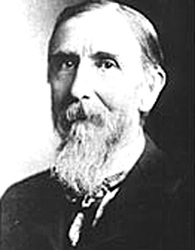Milton Bradley is a household name for his creation of such board game classics as The Game of Life, but he was more than just an inventor. His fascination with the process of learning, coupled with his skill at printing, made him a pioneer in the field of early childhood education as well.
Milton Bradley’s Early Days
Milton Bradley was born November 8, 1836, in Vienna, Maine, but for the first few years of his life, Bradley’s parents moved often throughout New England, while his father worked odd jobs. Eventually, the family settled in Lowell, Massachusetts. Bradley was a good student who went on to study drafting in Cambridge, Massachusetts, but he dropped out when his parents decided to move to Connecticut.
Sources in this Story
- Biography.com: Milton Bradley
- New England Historical Society: Milton Bradley and His Life’s Checkered Past
- Central Maine.com: Lecture at Maine State Museum illustrates life of Milton Bradley, who was born in Vienna
- Froebel Web: Milton Bradley
Bradley’s Notable Accomplishments
Bradley worked for several years as a mechanical draftsman and patent agent in Massachusetts. He then became fascinated with the art of lithography, bought a used machine and went into business printing technical drawings for local businesses.
After playing an imported board game at a friend’s house, Bradley was inspired to create his own game, in which the player found success by moving through squares marked with various life events and ultimately achieving “Happy Old Age.” Bradley named it “The Checkered Game of Life.” Within its first year of printing, 40,000 copies were sold. (The modern version, “The Game of Life,” bears very little resemblance to the original.)
While producing sketches of weapons for local manufacturers, Bradley’s thoughts turned to Civil War soldiers left in the field for long periods without amusement. He produced smaller kits of games and sent them to Union troops.
The Man and his Work
- “Inventors and Creators: Milton Bradley” by Raymond H. Miller
- “Paradise of Childhood: A Practical Guide to Kindergartners” by Edward Wiebe and Milton Bradley
- The Game of Life
The Rest of the Story
In 1869, Bradley developed in an interest in Friedrich Froebel’s German Kindergarten movement, which favored simplified learning for young children over the harsh methods of treating children as miniature adults—a standard in the educational settings of the day. By publishing a book by Edward Wiebe called “Paradise of Childhood,” Bradley established his company as an educational enterprise that later led to it being the leading purveyor of educational materials for American schools.
For Bradley, the Kindergarten movement was more than a business enterprise. He truly believed in its tenets and brought up his two daughters in its particular philosophy. He developed a series of “gifts” for young children that would teach them higher concepts such as division while they engaged in play. One of his lasting legacies is his method of teaching color: he designed a color wheel and wrote four books on color education for very young students.
Bradley died at the age of 74 on May 30, 1911, in Springfield, Massachusetts. His company continued to produce games and puzzles until 1984; it was then acquired by the Hasbro Company, which continues to use the Milton Bradley name.
This article was originally written by Jennifer Ferris; it was updated November 6, 2017.











